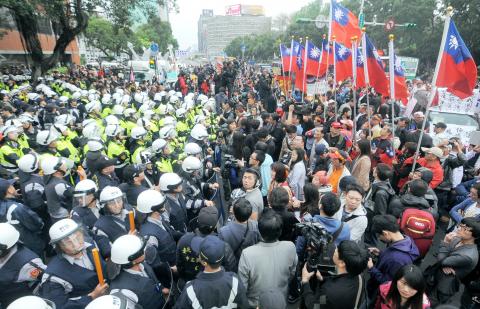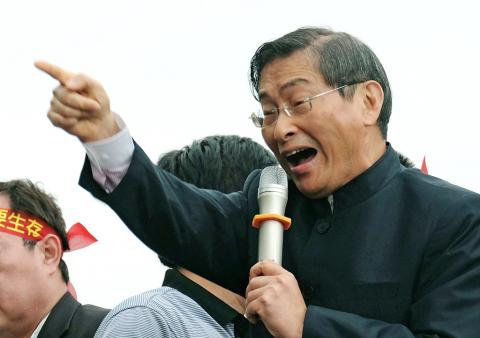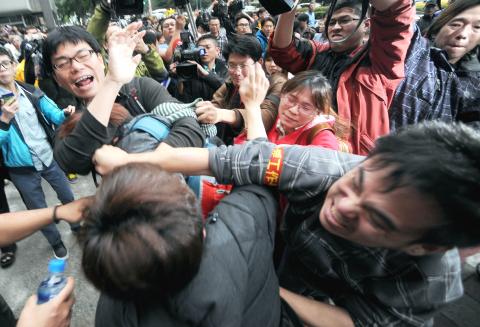Former gang leader Chang An-le (張安樂), who heads the China Unification Promotion Party, led hundreds of people to the streets near the Legislative Yuan in Taipei yesterday to demand that the students who have been “illegally” occupying the legislative chamber “return the legislature.”
Chang, known as the “White Wolf,” said on Monday that he would not take part in yesterday’s counter-protest, but he did not explain his change of heart yesterday.
He said the two main student leaders, Chen Wei-ting (陳為廷) and Lin Fei-fan (林飛帆), were “employed students,” a phrase coined during the Martial Law era to refer to students who worked for the Chinese Nationalist Party (KMT) regime to spy on their peers and report any “unlawful” action against the state.

Photo: Wang Min-wei, Taipei Times
Chen and Lin led hundreds of students in the occupation of the legislative chamber on March 18. The student protesters, who have grown into the Sunflower movement, are demanding that a mechanism to monitor cross-strait talks be established before legislators resume their review of the controversial service trade pact with Beijing.
Accompanied by two student members of the pro-unification New Party — Wang Puchen (王炳忠) and Lin Ming-cheng (林明正) — Chang and his supporters engaged in an hours-long standoff against supporters of the Sunflower movement at one end of Zhengjiang Street, with scores of policemen acting as a buffer between the two sides.
Chang and his group criticized the police for being “blind to the criminal activities” inside the Legislative Yuan, while blocking “law-abiding citizens” from entering the building, “which belongs to everybody.”

Photo: Sam Yeh, AFP
One woman called the students in the legislative chamber “green guards” who were being directed by the Democratic Progressive Party.
At one point, Chang, apparently upset by pro-Sunflower supporters calling him a gangster, angrily shouted: “You are all fucking offspring of Chinese, but you do not deserve to be Chinese. Chinese people do not want you.”
The students responded with applause and laughter, with many shouting: “We are not Chinese anyway. We are Taiwanese.”

Photo: Liu Hsin-de, Taipei Times
Thousands of students supporting the Sunflower movement gathered outside the Legislative Yuan — mostly along Qingdao E Road — to protect those inside.
They responded to Chang and his protesters by singing Island’s Sunrise (島嶼天光), which has become the Sunflower movement’s anthem, and chanting: “Retract the cross-strait service trade agreement” and “Safeguard our democracy.”
Mocking Chang, who allegedly paid for “walkers” to join his demonstration, the students said: “We do not need ‘employed walkers’ to protect democracy.”
Hearing that Chang’s group was asking to meet with student representatives to deliver a petition, Fu Jen Catholic University philosophy professor Shen Ching-kai (沈清楷), who was outside the legislature, said the pro-pact demonstrators were directing themselves at the wrong people.
“Should not those in power be the ones held accountable for people’s complaints?” he said.
Responding from the legislative chamber, Chen said that Chang and his group should be appealing to the Presidential Office, not the anti-pact students.
“The president and the lawmakers are the people who have the real power. The question is not to ask us when are we leaving the Legislative Yuan, but when these people will begin to solve the problem.”
One pro-Sunflower student was hurt after being chased by pro-pact protesters, who threw bottles at him.
Chang’s followers included members of the pro-unification Patriot Association and the Chinese Cross-Strait Women’s League.
His group dispersed after 5pm, but Chang said he would be back.

Tropical Storm Gaemi strengthened into a typhoon at 2pm yesterday, and could make landfall in Yilan County tomorrow, the Central Weather Administration (CWA) said yesterday. The agency was scheduled to issue a sea warning at 11:30pm yesterday, and could issue a land warning later today. Gaemi was moving north-northwest at 4kph, carrying maximum sustained winds near its center of up to 118.8kph and gusts of 154.8kph. The circumference is forecast to reach eastern Taiwan tomorrow morning, with the center making landfall in Yilan County later that night before departing from the north coast, CWA weather forecaster Kuan Shin-ping (官欣平) said yesterday. Uncertainty remains and

SEA WARNING LIKELY: The storm, named Gaemi, could become a moderate typhoon on Wednesday or Thursday, with the Taipei City Government preparing for flooding A tropical depression east of the Philippines developed into a tropical storm named Gaemi at 2pm yesterday, and was moving toward eastern Taiwan, the Central Weather Administration (CWA) said. Gaemi could begin to affect Taiwan proper on Tuesday, lasting until Friday, and could develop into a moderate typhoon on Wednesday or Thursday, it said. A sea warning for Gaemi could be issued as early as Tuesday morning, it added. Gaemi, the third tropical storm in the Pacific Ocean this typhoon season, is projected to begin moving northwest today, and be closest to Taiwan on Wednesday or Thursday, the agency said. Today, there would likely

DISRUPTIONS: The high-speed rail is to operate as normal, while several airlines either canceled flights or announced early departures or late arrivals Schools and offices in 15 cities and counties are to be closed today due to Typhoon Gaemi, local governments announced last night. The 15 are: Taipei, New Taipei City, Taoyuan, Tainan, Keelung, Hsinchu and Kaohsiung, as well as Yilan, Hualien, Hsinchu, Miaoli, Chiayi, Pingtung, Penghu and Lienchiang counties. People should brace for torrential rainfall brought by the storm, with its center forecast to make landfall on the east coast between tonight and tomorrow morning, the Central Weather Administration (CWA) said. The agency issued a sea warning for the typhoon at 11:30pm on Monday, followed by a land warning at 11:30am yesterday. As of

CASUALTY: A 70-year-old woman was killed by a falling tree in Kaohsiung as the premier warned all government agencies to remain on high alert for the next 24 hours Schools and offices nationwide are to be closed for a second day today as Typhoon Gaemi crosses over the nation, bringing torrential rain and whipping winds. Gaemi was forecast to make landfall late last night. From Tuesday night, its outer band brought substantial rainfall and strong winds to the nation. As of 6:15pm last night, the typhoon’s center was 20km southeast of Hualien County, Central Weather Administration (CWA) data showed. It was moving at 19kph and had a radius of 250km. As of 3pm yesterday, one woman had died, while 58 people were injured, the Central Emergency Operation Center said. The 70-year-old